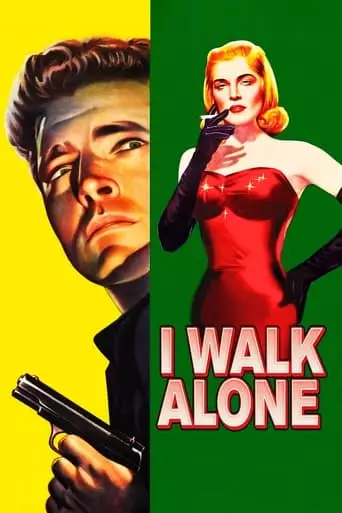
Bootleggers on the lam Frankie and Noll split up to evade capture by the police. Frankie is caught and jailed, but Noll manages to escape and open a posh New York City nightclub. 14 years later, Frankie is released from the clink and visits Noll with the intention of collecting his half of the nightclub’s profits. But Noll, who has no intention of being so equitable, uses his ex-girlfriend Kay to divert Frankie from his intended goal.
I Walk Alone (1947) is a classic film noir directed by Byron Haskin, featuring a compelling cast led by Burt Lancaster, Kirk Douglas, and Lizabeth Scott. The film delves into themes of betrayal, loyalty, and the moral complexities of the criminal underworld.
The narrative centers on Frankie Madison (Burt Lancaster) and Noll Dink Turner (Kirk Douglas), who were once partners in a bootlegging operation during Prohibition. After serving a 14-year prison sentence, Frankie is eager to reunite with Dink and claim his share of their illicit earnings. However, upon his release, Frankie discovers that Dink has transformed into a legitimate businessman, operating a successful nightclub, The Regency. Dink’s refusal to honor their previous agreement leads to escalating tensions, with Frankie seeking justice and retribution. The film unfolds as a tense exploration of betrayal, moral conflict, and the pursuit of justice.
Betrayal and Loyalty
At its core, I Walk Alone examines the theme of betrayal. Frankie’s expectation of loyalty from his former partner is shattered when Dink prioritizes personal gain over their shared past. This betrayal propels the narrative, highlighting the fragility of trust and the consequences of forsaking it.
Moral Ambiguity
The film delves into the moral complexities of its characters. Frankie, despite his criminal background, is portrayed with a sense of honor and a desire for fairness. In contrast, Dink embodies the corrupting influence of power and wealth, showcasing the nuanced portrayal of morality within the criminal underworld.
Justice and Retribution
The pursuit of justice is a central theme, with Frankie seeking retribution for the wrongs he perceives. The film explores the personal cost of seeking justice outside the law, raising questions about the ethics of vigilantism and the true meaning of justice.
The American Dream and Its Discontents
I Walk Alone subtly critiques the notion of the American Dream. Dink’s transition from a bootlegger to a legitimate businessman reflects the era’s emphasis on success and prosperity. However, the film questions the integrity of such success, suggesting that the pursuit of wealth can lead to moral compromise and personal betrayal.
Upon its release, I Walk Alone received mixed reviews. Critics like Bosley Crowther of The New York Times criticized the film for its portrayal of low-class characters and melodramatic elements. However, the film has since gained recognition for its exploration of moral themes and the dynamic performances of its leads. It stands as a notable example of post-war film noir, reflecting the era’s societal anxieties and the complexities of human nature.
Viewing I Walk Alone is likely to evoke a range of emotions, from tension and suspense to contemplation. The film’s exploration of complex moral themes and its portrayal of flawed characters may leave you reflecting on the nature of justice and human relationships. The dynamic performances and engaging narrative ensure a memorable cinematic experience that resonates long after the credits roll.
In conclusion, I Walk Alone stands as a significant work within the film noir genre, offering a compelling narrative and complex character studies. Its exploration of timeless themes and moral dilemmas continues to captivate audiences, solidifying its place as a classic in American cinema.
